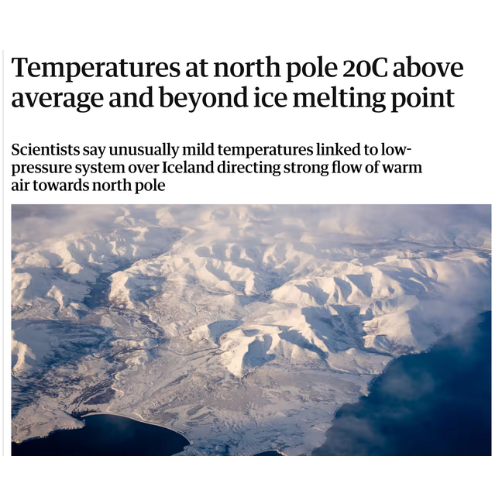North Pole Temperatures Soar 20°C Above Average: A Dire Warning for Global Climate Stability: The Gurdian
What has just happened?
The Arctic, often referred to as the Earth’s natural refrigerator, is experiencing unprecedented warming. Recent data reveals that North Pole temperatures have surged 20°C above the average, surpassing the melting point of ice. This alarming trend raises serious concerns about rapid ice loss, rising sea levels, and the broader implications for global climate stability.
Record-Breaking Temperature Anomalies: Why?
Recent climate observations indicate that the Arctic has been warming at an accelerated pace, with February 1st temperatures between 1991 and 2020 already 18°C above normal levels. Now, with an increase of 20°C, the situation is reaching critical levels. Scientists attribute this drastic warming to a combination of greenhouse gas emissions, shifting atmospheric circulation patterns, and the unique vulnerability of Arctic ice to rising temperatures.
Arctic Warming Four Times Faster Than Global Average
Since 1979, temperatures in the Arctic have been increasing at nearly four times the rate of the global average. This phenomenon, known as Arctic amplification, occurs due to a combination of feedback loops, including ice-albedo feedback. The Arctic plays a crucial role in regulating global temperatures, and its rapid warming has far-reaching effects on global weather patterns and ocean currents.
Impact of Weather Systems and Ocean Temperatures
One of the primary drivers behind this extreme Arctic temperature rise is low-pressure systems that funnel warm air toward the North Pole. Additionally, rising sea surface temperatures in the North East Atlantic contribute to warming Arctic conditions, as warmer ocean currents carry heat northward, further accelerating ice melt.
The Albedo Effect and Its Role in Arctic Warming
The albedo effect is a critical climate process in the Arctic. Ice and snow reflect sunlight, reducing heat absorption and maintaining lower temperatures. However, as Arctic ice melts, darker ocean surfaces are exposed, absorbing more heat and accelerating warming. This creates a self-reinforcing cycle, increasing temperature disparities and disrupting global climate patterns.
Consequences of Melting Arctic Ice
The rapid warming of the Arctic has severe implications, including:
- Rising Sea Levels: Melting ice contributes directly to sea level rise, threatening coastal cities worldwide.
- Extreme Weather Events: Disruptions in the polar jet stream can lead to extreme weather patterns, including heatwaves, storms, and prolonged cold spells in various regions.
- Biodiversity Loss: Arctic ecosystems are particularly vulnerable, with species like polar bears, seals, and indigenous communities facing habitat loss.
- Disruptions to Ocean Circulation: Changes in Arctic ice and temperature affect major ocean currents, such as the Atlantic Meridional Overturning Circulation (AMOC), which regulates climate conditions across the globe.
Global Climate Policies and Urgent Action Needed
With the Arctic nearing a tipping point, global action is critical. The Paris Climate Agreement aims to limit global temperature rise to 1.5°C above pre-industrial levels, yet current trends show the world is fast approaching this threshold. Policy interventions such as carbon border adjustment mechanisms, stricter emissions regulations, and investment in renewable energy are necessary to mitigate further climate damage.
Upskill with ESGPro Mastery Institute
As the world grapples with climate change, understanding ESG (Environmental, Social, and Governance) reporting is crucial. ESGPro Mastery Institute offers a free session on ESG Reporting, covering GRI (Global Reporting Initiative) and BRSR (Business Responsibility and Sustainability Reporting) to help professionals navigate sustainability challenges. Join us today and stay ahead in the evolving field of sustainability.
Conclusion
The Arctic’s rapid warming is not just an environmental concern; it is a global crisis with far-reaching consequences. Immediate action is required to curb emissions, protect fragile ecosystems, and implement sustainable policies. The time to act is now—before the Arctic, and the planet, reach an irreversible tipping point.
Stay Updated
Follow ESGPro Mastery Institute on LinkedIn and YouTube for the latest updates, news, and alerts about the ESG & Sustainability Finance Alerts.
📈 With ESGPro Mastery Institute, discover tailored strategies for ESG integration and stakeholder wealth maximization.
🙌 How ESGPro Mastery Institute Advisory Can Help
At ESGPro Mastery Institute, we specialize in empowering organizations to transition toward sustainable practices while maximizing stakeholder value. Conect with us: info@esgproinvest.com
Our comprehensive ESG advisory services include:-
Comprehensive ESG Risk Assessments
– ESG Investment Banking Solutions
– Stakeholder Engagement Programs
– Customized ESG Transition Strategies

